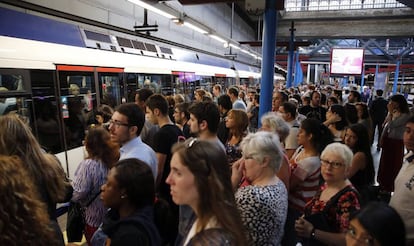Madrid braces itself for double transportation strike on Tuesday
Subway and train service will be considerably reduced as workers pressure for better conditions


Madrid is bracing itself for a day of transportation strikes on Tuesday.
Getting around the Spanish capital will be complicated by the coincidence of stoppages on the subway and railway systems.
On Monday, the first day of reduced service on the Metro, platforms were filled with commuters and there was a spike in road accidents during morning rush hour.
Cattle travel in better conditions than we do
Angry subway passenger
On Tuesday, the delays will be compounded by a strike by Renfe train drivers. These protests, which began on Friday, have been triggered by workers’ demands for more personnel to cover shifts and meet service requirements, following the layoff of more than 330 employees over the last five years.
Train service is being reduced to 75% of the usual frequency at rush hour (6am to 9am, 1.30pm to 3.30pm and 6pm to 9pm) and to 50% the rest of the time.
Meanwhile, subway workers feel that management is trying to deregulate their working conditions to the detriment of the service. The strike comes after six months of fruitless negotiations, said union representatives.
Sign up for our newsletter
EL PAÍS English Edition has launched a weekly newsletter. Sign up today to receive a selection of our best stories in your inbox every Saturday morning. For full details about how to subscribe, click here.
Minimum service on the Metro is set at 65% of regular frequency at rush hour.
The city of Madrid has yet to confirm whether it will roll out additional buses to make up for the cuts. Mobility councilor Inés Sabanés declined to comment on the issue during an event on Sunday.
On Friday, the railway stoppages were already making life difficult for thousands of commuters trying to get into Madrid from the suburbs. Besides the fewer trains, those that did circulate did so at a lower speed than usual, or else came to a stop in between stations for prolonged periods of time, driving passengers to despair.
“Cattle travel in better conditions than we do,” complained one user on a social network.
A similar situation unfolded on Monday morning on the Metro, where passengers were packed tight into the cars as trains pulled out of overcrowded stations.
Meanwhile, Madrileños who opted to take the car found themselves trapped in traffic snarls stretching several kilometers along the A-4, the A-5, the A-1 and the M-40. A series of minor accidents forced several lanes to be closed off, pushing rush hour beyond 10am at some spots, according to the traffic authority DGT.
English version by Susana Urra.
Tu suscripción se está usando en otro dispositivo
¿Quieres añadir otro usuario a tu suscripción?
Si continúas leyendo en este dispositivo, no se podrá leer en el otro.
FlechaTu suscripción se está usando en otro dispositivo y solo puedes acceder a EL PAÍS desde un dispositivo a la vez.
Si quieres compartir tu cuenta, cambia tu suscripción a la modalidad Premium, así podrás añadir otro usuario. Cada uno accederá con su propia cuenta de email, lo que os permitirá personalizar vuestra experiencia en EL PAÍS.
¿Tienes una suscripción de empresa? Accede aquí para contratar más cuentas.
En el caso de no saber quién está usando tu cuenta, te recomendamos cambiar tu contraseña aquí.
Si decides continuar compartiendo tu cuenta, este mensaje se mostrará en tu dispositivo y en el de la otra persona que está usando tu cuenta de forma indefinida, afectando a tu experiencia de lectura. Puedes consultar aquí los términos y condiciones de la suscripción digital.








































